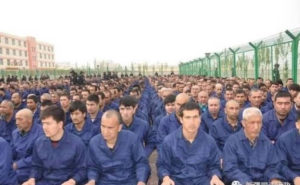ENCINO, CA – Jewish World Watch (JWW), a Los Angeles-based organization fighting against genocide and mass atrocities worldwide, launched today a groundbreaking database detailing how global companies are complicit in forced labor. JWW’s Uyghur Forced Labor Database – the most extensive to date – brings to light more than 600 national and international companies and their ties to the Xinjiang region of China, where the Uyghur people are experiencing an ongoing genocide. See the Database at jww.org/database
The Database launches a day after the implementation of the Uyghur Forced Labor Prevention Act (UFLPA), a law that ensures goods made with forced labor in Xinjiang do not enter the United States market.
“The Uyghur Forced Labor Database is a crucial tool for consumers around the globe who care deeply about human rights,” JWW Executive Director Serena Oberstein said. “The more information about the cars we drive, the shirts we wear and the products we use can lead to a safer, more prosperous world. We will continue shining a light on the darkest regions of the world and, through this innovation, Jewish World Watch is sending a message that we will always fight for justice.”
Many of the world’s largest companies are listed, including Apple, H&M Group, Adidas, Gap, General Electric, IKEA, Nike, Sony, Target U.S., Tesla, Volkswagen and Wayfair. JWW’s innovative online database reveals the pervasive use of Uyghur forced labor that affects nearly every facet of life for consumers around the world as goods from China continue to flood the American market. In the first quarter of 2021, when the extent of Uyghur forced labor within Chinese supply chains was already well-documented, imports into the U.S. from the region rose 113%, up nearly 47% from the previous year.
“The Uyghur Forced Labor Database serves as the latest chapter in Jewish World Watch’s storied history of shining a light on the darkest regions of the world,” said Congressman Brad Sherman. “As a champion of legislation in Congress to combat the ongoing crimes committed against Uyghurs, such as the Uyghur Forced Labor Prevention Act, I commend Jewish World Watch for this innovative and critical instrument that will aid conscientious consumers as well as our efforts to combat systematic forced labor in the Uyghur region and around the world.”
The Database documents companies known to import goods made with Uyghur forced labor through direct shipments, labor transfers to other regions of China, where the goods are imported from, intermediary manufacturers, source blending, and fraudulent supply chain information.
“The Uyghur Forced Labor Database is an essential tool for holding companies with forced labor in their supply chains to account,” Forced Labor Program Director at Global Labor Justice-International Labor Rights Forum Allison Gill said, “and for the United States government, which has promised robust enforcement of the Uyghur Forced Labor Prevention Act to stop good produced with forced labor from flooding the U.S. economy.”
The Uyghur Forced Labor Database is an amalgamation of up-to-date research and data from reports culled from the Helena Kennedy Centre for International Justice at Sheffield Hallam University, the Australian Strategic Policy Institute and RWR Advisory Group, among others.
“The evidence keeps mounting regarding the many sectors and individual companies that are engaged in systematic state-sponsored forced labor in the Uyghur Region,” Professor Laura T. Murphy of Sheffield Hallam University said. “We very much need a resource that compiles all of this information for consumers, advocates and the trade community.”


